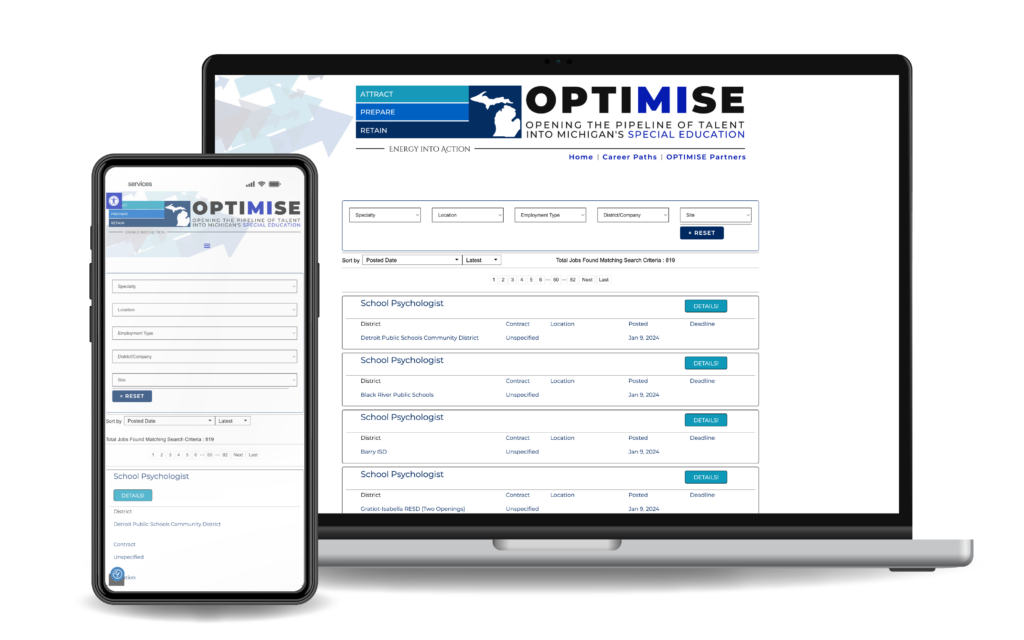Michigan’s Special Education Teachers
A special education teacher is a highly trained, caring, professional that helps students reach their fullest potential. Teachers in this fulfilling and rewarding career prepare, adapt, and deliver instructional materials to students who have a disability. Special education teachers work in public or private school’s and help students with special needs – including behavioral disorders, intellectual disabilities, and physical disabilities that create academic challenges.
Start Your Michigan Special Education Journey
Step 1: Earn a bachelor’s degree in special education or a related field.
Step 2: Complete a Teacher Preparation Program (TPP) in special education.
- The TPP will teach you classroom management, teaching strategies for children with disabilities, and more.
- When the TPP is completed, students must talk with their Michigan Preparation Provider about when to take the required testing.
Step 3: Complete required reading courses (6 semester credit hours for elementary teachers and 3 semester credit hours for secondary teachers).
Step 4: Required MTTC Testing.
- Pass the appropriate Michigan Test for Teacher Certification (MTTC).
- Before taking the MTTC, speak with your Michigan Preparation Provider.
Questions regarding placement, assignment, role and services allowed for individuals working under either of these options should be directed to the Office of Special Education at MDE-OSE@Michigan.gov.
Become a Special Education Teacher Consultant
Take the next step in your career and become a teacher consultant in Michigan.
Volunteer to Gain More Experience!
Get hands-on experience and find a classroom near you that is in need of a volunteer!
Job Shadow a Special Education Teacher
To participate in a job shadow, reach out to a school district and request to job shadow a special education teacher for a day.
Each school district has their own policy when it comes to job shadowing, but you may need a state ID or a driver’s license to participate.
College Program Information
Click a point on the map to find degree programs, scholarships, grants, and organizations to join!
Special Education Teacher Educational Funding
Free College Opportunities
Allows students to earn college credit (up to 10 courses) while in high school at no cost between 9th-12th grade. The classes that students are eligible for must not be offered by the high school or PSA and must lead towards postsecondary credit, accreditation, certification, and/or licensing.
How to apply – Students are to talk with their high school advisor on eligibility, application, deadlines, and college course options.
A Michigan Department of Education approved five-year program of study.
EMCs work closely with certain colleges to provide students with an opportunity earn a high school diploma and one or more of the following:
- 60 transferable college credits.
- An associate degree.
- A professional certification.
- The Michigan Early Middle College Association (MEMCA) technical certificate.
- Participation in a registered apprenticeship.
The Michigan Achievement Scholarship is designed to help students pursue their dreams, goals, and aspirations in the Mitten State! Graduating high school seniors are eligible to earn a skill certificate or degree at their local community college tuition-free just by filling out the new and simplified FAFSA.
State Scholarships & Grants
Talent Together helps you become a certified teacher. The program also helps elevate the professional credentials of existing teachers with “add-on endorsements” and mentorship training to be a lead with “teacher apprentices” at the school district.”
Michigan Reconnect is a scholarship program that pays you to attend your in-district community college tuition free or pays up to the in-district rate if you attend a community college where you’re considered out-of-district. Applicants must be 25 years old to apply.
Thirteen Promise Zones have already begun awarding scholarships. Educators, businesses, families and civic leaders are also striving to embed a pervasive culture of learning in these communities – an essential ingredient in any recipe for education success.
Amount: up to $800
Amount: $10,000
Amount: $9,600 Stipend
Amount: $2,000 – $5,500
Federal Scholarships & Grants
Colleges and career schools use the FAFSA form to determine how much financial aid you’re eligible to receive, which could include grants, scholarships, work-study funds, and loans.You must apply for aid every year.
The Federal Student Aid Estimator provides an estimate of how much federal student aid the student may be eligible to receive. These estimates are based on the Student Aid Index (SAI), an index to determine federal student aid eligibility.
Direct Subsidized Loans and Direct Unsubsidized Loans are federal student loans offered by the U.S. Department of Education (ED) to help eligible students cover the cost of higher education at a four-year college or university, community college, or trade, career, or technical school.
A federal grant for undergraduate students with financial need.
Amount: up to $17,500
If you’re employed by a government or not-for-profit organization, you might be eligible for the PSLF Program. The PSLF Program forgives the remaining balance on your Direct Loans
*Borrowers can’t receive credit toward TLF and Public Service Loan Forgiveness (PSLF) for the same period of service. That means, if you seek and receive TLF, the five-year period of service that supported your eligibility will NOT count toward PSLF. We recommend that you consider whether you’re interested in PSLF before deciding to pursue TLF, because we can’t make changes once you receive forgiveness.
Direct PLUS loans can help pay for education expenses not covered by other financial aid. The U.S. Department of Education makes Direct PLUS Loans to eligible graduate or professional students through schools participating in the Direct Loan Program.
Grant for undergraduate students with exceptional financial need, administered directly by financial aid office at each participating school, not all schools participate
part-time employment while enrolled in school, available to undergrad, grad, and professional students with financial need, available to full and part-time students, administered by participating schools, emphasizes employment in civic education and work related to course of study or civic education, on or off campus
Amount: up to $4,000/year
Special Education Story Tellers
Below are videos highlighting special education teachers throughout Michigan.
Watch to find out why they love the profession!
Eastern Upper Peninsula ISD
Eastern Upper Peninsula ISD
Eastern Upper Peninsula ISD
Northwest Education Services
Gogebic-Ontonagon ISD
Marquette-Alger RESA - Transition Teacher
Hancock Public Schools
A Parents Story
Farmington High School
Early Childhood Consult
Oakland Schools, MI
Special educators benefit from a very diverse career path. Danya Stump explains how her unique profession improves the lives of teachers and students.
Early Childhood Consult
Mona Shores Middle School, MI
Thousands of K-12 general-education students are building friendships with kids that have a disability. What that does will surprise you.
College Students Speak out!
Michigan college students explain why they are becoming a Special Educator.
Central Michigan University Creates Leading Edge Special Educators
Simulation classrooms and real world collaborations are boosting the skills and confidence of newly graduated teachers.
Special Educators Speak Out
The passion for teaching advances Michigan kids that have a disability.
Young Teachers Interesting Traits
Special Educators, Many Paths With Passion
Metro Detroit
Two leading school administrators explain Michigan’s career paths in special education.
Special Education Students Career Path
Central Michigan University
How Special Education Has Advanced
Central Michigan University
Mallory Bycraft
Inclusion Support Specialist, Bay City
From Miss Michigan 2019 to becoming a star teacher. Mallory Bycraft’s teaching career led to becoming an inclusion support specialist. These educators help general education teachers to create individualized ways to advance students with special needs.
Gina Alexander & Cynthia Green
Detroit Public Schools Community District
A certified special education teacher and school administrator explain the passion that comes from being a special educator.



